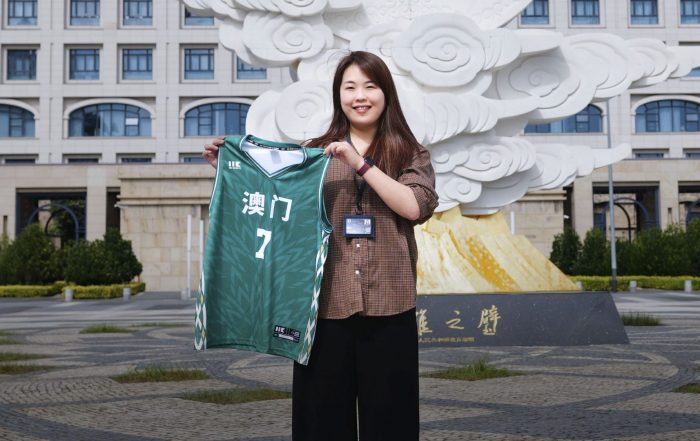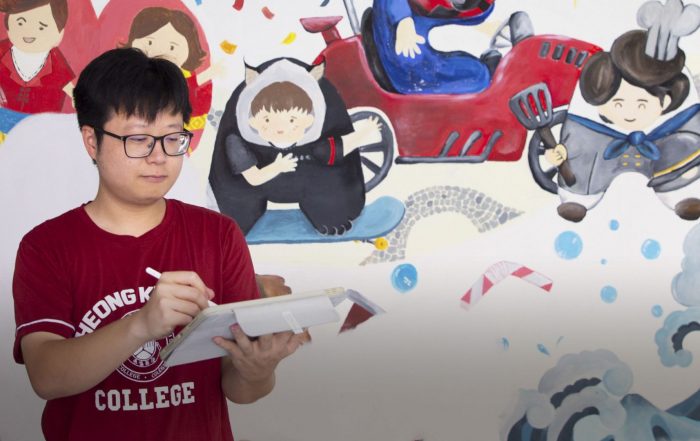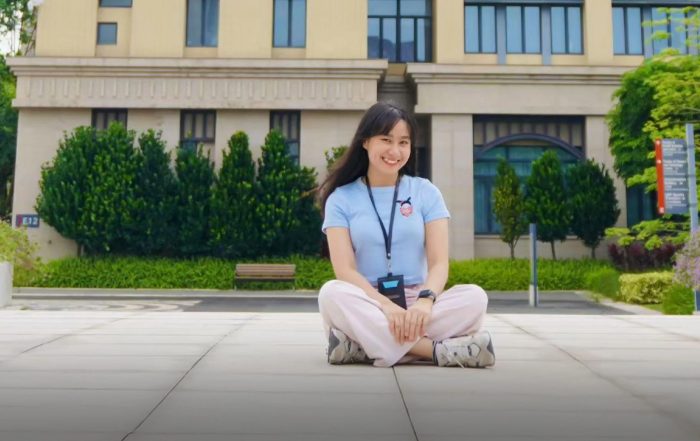As dusk settles over the Macao Peninsula, the setting sun casts a warm glow through the windows of Joaquim Vong Keng Hei’s office. On his desk sits a fresh black coffee, Joaquim has just finished a meeting and is due in an hour and a half to deliver a lecture to postgraduates at the University of Macau (UM), his alma mater. During this brief break, he tells us about his journey from growing up in a legal family to becoming a pioneer of the rule of law in the Guangdong-Hong Kong-Macao Greater Bay Area (GBA), and from working as a practising lawyer to becoming a part-time instructor at UM. He also recounts a decade spent building a bridge for cross-border legal services between Macao and various mainland provinces and municipalities in the Chinese mainland, as well as other cities in the GBA.
Embarking on a career path shaped by family influence
Joaquim’s connection with the law began when he was a teenager. His father is the first locally born Chinese lawyer in Macao, while his mother worked as a civil servant in a legal department. Growing up in this environment, Joaquim developed a basic understanding of the legal profession during his secondary school years. ‘Many people’s first impression of lawyers comes from Hong Kong television dramas: being eloquent in court and then hitting the bars to unwind after work. But to me, a lawyer is someone like my father, who always immerses himself in case files and discusses clients’ cases with colleagues, yet still finds time to teach and mentor after work.’
Fuelled by a love of history and geography, and with an understanding of the legal profession, Joaquim chose to study law at university. Eager to join the legal profession in Macao as soon as possible, he decided to study at UM, which is also his father’s alma mater. ‘The UM Faculty of Law brings together faculty members who know Macao’s legal system best, including many judges and lawyers. They have robust theoretical knowledge, strong research capabilities, and extensive experience, and their lectures are of great benefit to my future practice in Macao,’ he adds.
Joaquim’s decision proved to be sound. Under the guidance of renowned professors such as Zhao Guoqiang, who specialises in criminal law, and Tong Io Cheng, who specialises in civil and commercial laws, he developed a strong academic foundation. Moreover, he established an extensive network during his time at UM. He says, ‘Many of the upper-level students and my classmates went on to work in the legal profession after graduation, either as lawyers or as civil servants in legal departments.’ Joaquim made the most of his time at university, working at law firms during the first three summers. In his final year, he switched to evening classes so that he could work full-time at a law firm during the day and gain more experience. All of this helped him fulfil his commitment to quickly joining the legal profession.
Broadening horizons in the GBA
In 2009, Joaquim graduated from UM and found himself at a crossroads. Around this time, a news story hit the headlines—the Standing Committee of the National People’s Congress approved the establishment of a new UM campus in Hengqin. Joaquim concluded that ‘Macao’s future development is inextricably linked to the Chinese mainland, and legal professionals who are well versed in both Macao and Chinese law will be in high demand.’
In order to continue working at the law firm, Joaquim decided to apply to Sun Yat-sen University for his postgraduate studies. The university is one of the country’s top institutions and is located near Macao. Behind this decision lay his father’s advice: ‘As a legal professional, you need to see the bigger picture. You must explore the laws of different places to broaden your horizons. Learn as much as you can and gain as much experience as you can, and you will be able to help more people in the future.’
In preparation for the postgraduate entrance exam, Joaquim travelled to Guangzhou to have his academic qualifications accredited. He then went to a bookshop in Zhuhai and returned home with a stack of reference books. His hard work paid off. Of all the candidates from Macao and Hong Kong, he was one of only three to pass the written exam and be eligible for an interview for the postgraduate programme offered by Sun Yat-sen University’s School of Law. Ultimately, he was the only candidate to pass the interview. ‘Out of all the candidates from Macao, Hong Kong and Taiwan, I was the only one admitted to the programme that year,’ Joaquim adds.
Two years of postgraduate study enabled Joaquim to break information cocoons. By stepping outside his comfort zone and distancing himself from his familiar Macao network, he gained valuable insights into the latest developments in the legal sector in the Chinese mainland. ‘Sun Yat-sen University is an excellent platform for legal research in the GBA. I was able to keep up to date with what mainland legal practitioners were engaging in and focusing on.’ This experience was a catalyst for his subsequent career development in the Chinese mainland. ‘Looking back now, the decision I made in 2009 was actually a strategic move,’ he says.
Venturing into the Chinese mainland
The promulgation of the Outline Development Plan for the Guangdong-Hong Kong-Macao Greater Bay Area in 2019 presented Joaquim with an opportunity to utilise his expertise. Having obtained his licence to practise law in Macao in 2014, he took part in setting up a partnership association between law firms in the Chinese mainland, Hong Kong, and Macao in the Guangdong-Macao In-Depth Cooperation Zone in Hengqin in 2019—one of the few platforms at the time offering one-stop cross-border legal services. From then on, travelling between Macao and Hengqin became part of his daily routine.
With a smile, Joaquim explains that all of this was thanks to the favourable policies introduced by the Mainland and Macao Closer Economic Partnership Arrangement (CEPA): ‘CEPA makes it easier for Macao and Hong Kong lawyers to provide professional services lawfully in the Chinese mainland, and this resolves many bottlenecks.’ He gives the following example: ‘A state-owned enterprise wants to invest in and acquire a company in Macao, and has to seek legal advice from Macao lawyers on how to satisfy regulatory requirements on both sides. However, due to its business ownership structure, the enterprise cannot transfer capital outside the Chinese mainland or sign contracts with lawyers practising outside the Chinese mainland. In such cases, our partnership association can bridge the gap by providing legal advice through Macao lawyers, while using the mainland platform to deliver the legal services.’ There are many similar examples, and each successful problem-solving experience has boosted Joaquim’s confidence and showed him the large market potential for cross-border legal services.
With a clearer plan in mind, Joaquim expanded his reach to Changsha in Hunan Province and Nanjing in Jiangsu Province in 2024. ‘We consider Hengqin and Nansha in the GBA to be our headquarters, and we have set up branches in Changsha to serve central China and in Nanjing to serve the Yangtze River Delta. Each branch has hundreds of local lawyers who support us and work closely with us,’ he says.
Practising Law in the GBA
While partnership associations make it easier for Macao lawyers to provide law services in the Chinese mainland, the Guangdong-Hong Kong-Macao Greater Bay Area Legal Professional Examination (GBA Examination) enables Macao lawyers to provide legal services directly within the GBA.
For Joaquim and his family, 31 July 2021 was an important day. Joaquim, his father Vong Hin Fai, and his sister Vong Sok Hei all passed the GBA Examination, obtaining their lawyer’s licences to practise law in the nine municipalities in the GBA. This also means that Joaquim’s legal services are available to a wider range of clients. He says, ‘I have handled many cases, including helping Macao residents recover employees’ compensation and rent. My identity as a Macao resident helps me gain a little more trust from my clients, as we share a common heritage and both speak Cantonese.’
Promoting Macao though social welfare activities
‘I have noticed that Hong Kong lawyers and accountants actively promote their services in the Chinese mainland, whereas Macao’s presence is relatively weak. This has given me a strong sense of mission,’ says Joaquim. This mission motivates him to dedicate a significant amount of time and energy to facilitating exchanges between Macao’s legal sector and those of the Chinese mainland, as well as Portuguese and Spanish-speaking countries. In addition to his busy career, Joaquim serves as deputy director of the Guangdong-Hong Kong-Macao Greater Bay Area Working Committee of the Guangdong Lawyers Association and as president of the Macao Legal Exchange and Promotion Association. He organises exchange activities, professional forums, and mock arbitrations each year in the nine municipalities in the GBA. He even organises badminton and e-sports competitions to foster closer ties between legal practitioners in Macao and the Chinese mainland. ‘We need to fully integrate the Macao legal sector into the Chinese mainland, thereby enabling more people to discover Macao and creating greater opportunities for mutual benefit,’ he adds.
To help more people understand Macao, Joaquim—who also holds the title of deputy director of the Zhuhai Foreign-Related Public Legal Service Center—produces a TV programme called ‘“You Ask, We Answer” Guangdong-Macao Laws Livestream’. He is the programme’s executive director and is also involved in scriptwriting. At first, he drove other Macao lawyers to Hengqin to record the programme, during which they explained the legal differences between Macao and Guangdong on various issues. Having run for over 150 episodes, the programme has been broadcast by TDM (a television broadcasting company in Macao), and has been well received by businesses and residents in both Macao and Hengqin. The programme has also led to the publication of the book Legal Guidelines for Zhuhai and Macao, an important vehicle for enhancing cross-border legal knowledge.
‘Individual success is meaningless if it does not contribute to collective advancement. What is truly meaningful is enabling more Macao lawyers to develop their careers beyond Macao and integrate into national development, so that more people recognise Macao’s development,’ says Joaquim, who has remained committed to this aspiration. He then points to the bookcase behind him, and says, ‘These are records of the many activities I have organised. Every time I look through them, I remember the days I spent working with my peers.’
Giving back to his alma mater
Like his father before him, Joaquim is a part-time instructor in the UM Faculty of Law. Before this interview, he has just finished his third cup of black coffee to give him energy for his evening class. ‘I am teaching the course ‘Macao Civil and Commercial Law’ to master’s students. With master’s programmes, it is more important to encourage students to study cutting-edge issues than to impart knowledge to them,’ he explains. He focuses on a law enacted in Macao within the past two or three years in each lecture. ‘Although these separate laws only apply to specific areas, I encourage students to consider how changes in wording could influence the amendment of Macao’s laws.’
His continued connection with his alma mater stems from the translated publication of Curso de Direito Administrativo Volume Ⅱ (Course on Administrative Law Volume II), which he translated with his father and sister in 2013. The book is part of Colecção de Textos Jurídicos da RAEM (Collection of Legal Texts of the Macao SAR). The original text was written by Diogo Freitas do Amaral, a former minister of foreign affairs of Portugal and professor of law at the University of Lisbon. It is a classic textbook for administrative law courses. Ever since completing the translation, Joaquim wanted to teach administrative law at his alma mater. Thanks to the translated publication and his experience in the legal sector, he finally secured a teaching position in the UM Faculty of Law. He has taught the undergraduate course ‘Administrative Law’ for over a decade, and later added the course ‘Civil Procedural Law’ to his teaching schedule. ‘Teaching and learning promote and enhance each other. Discussing cases with my students enables me to think from different perspectives,’ says Joaquim. He views teaching as a form of training and has never stopped teaching, no matter how busy he has been at the law firm.
According to Joaquim, the greatest strengths of legal talent cultivated by UM lie in their global perspective, understanding of Macao, and connections with the Chinese mainland. UM’s distinct geographical location enables it to leverage the benefits brought by the ‘one country, two systems’ policy and its high level of openness. Furthermore, the university brings together legal professionals from Portuguese-speaking countries and regions, and provides high-quality foreign-related legal education in the GBA, thereby familiarising students with the civil law system and relevant legislation in the region. To capitalise on this, Joaquim often incorporates external resources into his lectures. For instance, he recently invited a prominent barrister from Hong Kong and a Macao-born lawyer practising in New York to discuss common law systems and exchange views with students.
Chinese Text: Gigi Fan
English Translation: Winky Kuan
Photo: Student helper Mengyu Chen, with some provided by the interviewee
Source: My UM Issue 148
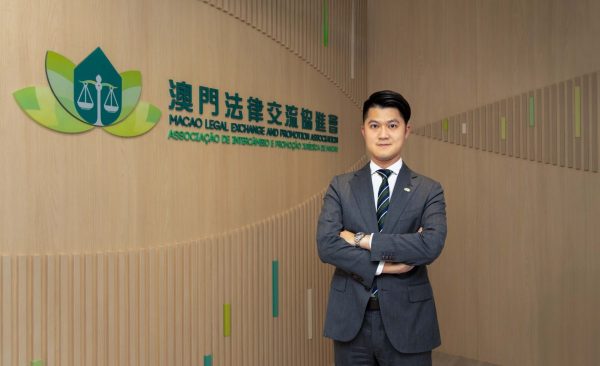
Joaquim Vong Keng Hei
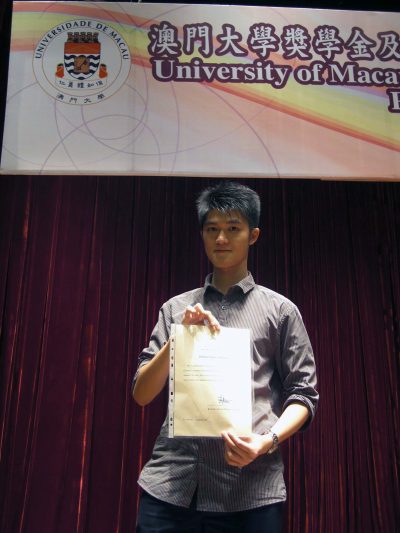
Joaquim graduated from the UM Faculty of Law in 2009
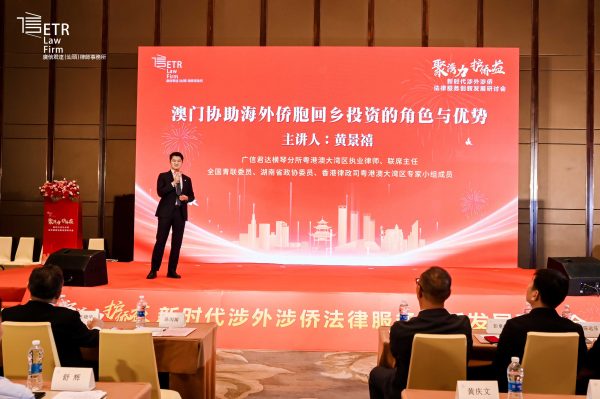
Joaquim takes part in exchange activities between legal practitioners in the GBA
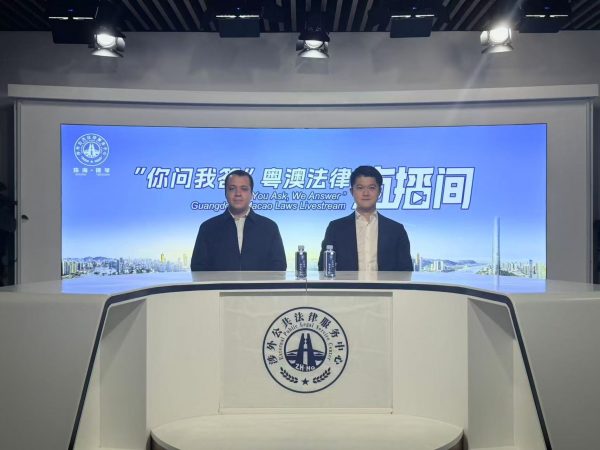
Joaquim’s TV programme ‘“You Ask, We Answer” Guangdong-Macao Laws Livestream’ is well received
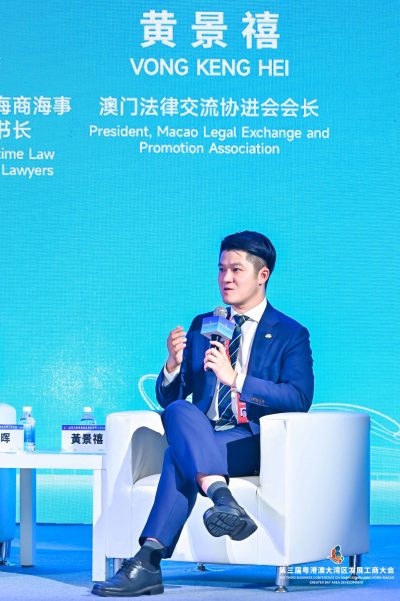
Travelling between Macao and the Chinese mainland to provide cross-border legal services is part of Joaquim’s daily routine


